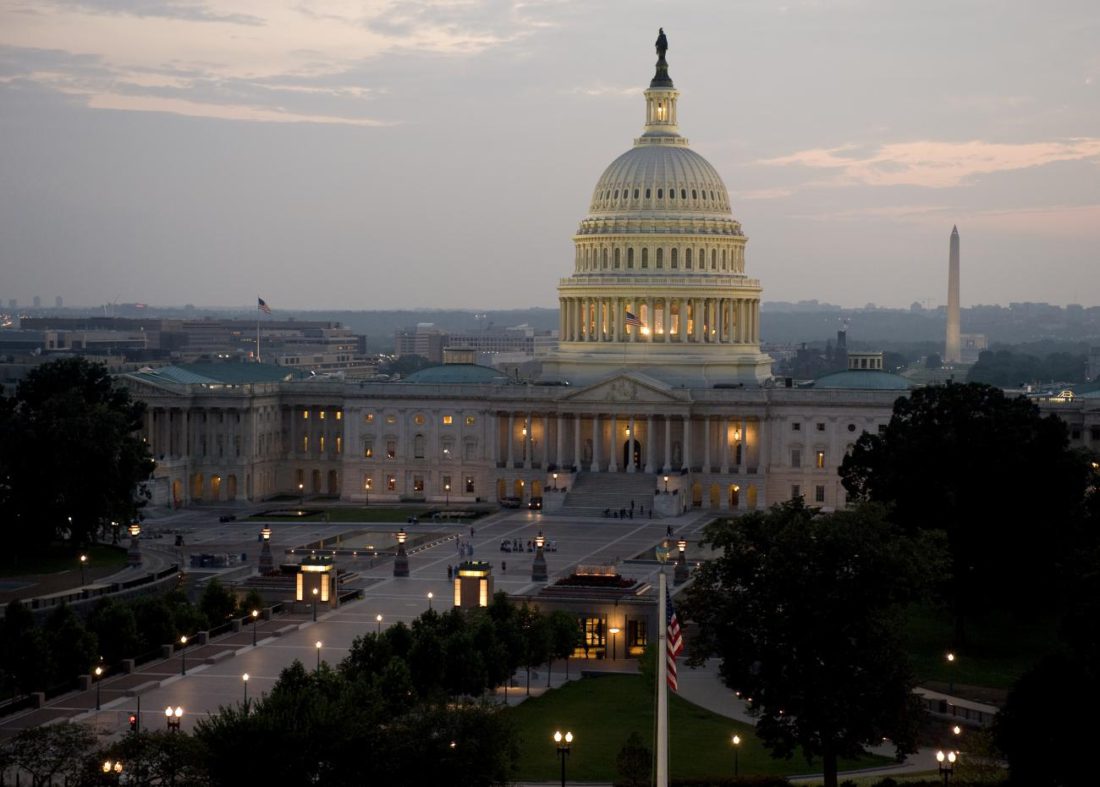By Jordan Wilkie, originally published by Carolina Public Press. Carolina Public Press is an independent, in-depth and investigative nonprofit news service for North Carolina.
North Carolina’s State Board of Elections, and likely the state’s appellate courts, will oversee a novel and politically charged challenge to keep first-term Republican Congressman Madison Cawthorn from running for office again.
The challenge, brought by a left-leaning nonprofit called Free Speech for People, seeks to make Cawthorn ineligible for public office by arguing that his conduct on and around Jan. 6, 2021, violated a section of the 14th Amendment of the U.S. Constitution that was originally meant to keep Confederates from regaining political power after the Civil War.
The section says people who have sworn oaths to the Constitution can be barred from holding public office if they “shall have engaged in insurrection or rebellion against the same, or given aid or comfort to the enemies thereof.”
Should the challenge go forward — it is on hold while the state Supreme Court figures out the redistricting lawsuit — a multicounty panel made of up local board of elections members will be asked to decide whether the storming of the U.S. Capitol Building was an insurrection under the federal constitutional meaning and whether Cawthorn engaged in it or gave aid or comfort to those who did.
This means that a quasi-judicial panel of appointed, partisan, county-level election administrators could decide questions of federal constitutional significance, potentially blocking a sitting congressman from running for reelection by way of a state law enforcing a federal constitutional standard.
Those dynamics raise a host of separate constitutional questions besides the one directly considered in the challenge and yet may be brought up in the process of deciding Cawthorn’s political fate.
For “typical voters,” people who are concerned about the upcoming Super Bowl, mortgage payments or their children’s extracurricular activities, this challenge and the ensuing legal fights will look like a mess, Western Carolina University political science professor Chris Cooper said.
“All of this confusion sows more distrust in a system and in a process that already has a considerable amount of distrust in it,” Cooper said.
Depose and subpoena
There seems to be a second motivation to challenge Cawthorn’s candidacy in North Carolina besides keeping him from running for reelection, Cooper said.
Under North Carolina law, the group that files a challenge can put the candidate in a deposition, or direct questioning under sworn oath of truthfulness, and subpoena their documents.
This could put Cawthorn in a position where he has to admit something about his actions on or before Jan. 6 that he wouldn’t otherwise have to acknowledge, Cooper said.
It is not clear what he would say or what documents the challengers would request. Anything the challengers receive from Cawthorn and then decide to submit as evidence against him would become public record, short of some kind of judicial intervention, per state laws. Those records could then be used in other investigations, such as the U.S. House committee investigating Jan. 6.

Cawthorn’s attorney, James Bopp Jr., a well-known conservative election lawyer, said he will “object and defend” against depositions and subpoenas.
This could lead to its own legal fight. There is no provision in the statutes that allow a candidate to block a deposition or subpoena, according to UNC School of Government public law and government professor Bob Joyce.
Bopp said not allowing such objections would be a violation of due process. He said he could not comment on what legal strategy he may take to keep Cawthorn from being questioned or turning over documents.
“We will, under the law, have an opportunity to object to depositions or whatever the case may be,” Bopp said. “And we’re going to take advantage of those, because there are substantial constitutional and legal defenses that Rep. Cawthorn has.”
One possible way to defend would be to file a lawsuit in federal court asking to block the candidate challenge proceedings, Joyce said. That would introduce further confusion into the challenge and could prolong the proceedings.
The attorneys bringing the challenge said they doubted such a strategy would work.
“By choosing to file his candidacy with the North Carolina State Board of Elections, Mr. Cawthorn has agreed to participate in the procedures set forth in North Carolina law for how the State Board of Elections resolves challenges to candidacy based on qualifications, and those include being deposed before the hearing,” said Ron Fein, the legal director of Free Speech for People.
An ‘unusual statute’
In press releases, Free Speech for People promised to pursue 14th Amendment claims against other politicians alleged to have helped organize or aid people who broke into and attacked the U.S. Capitol on Jan. 6, 2021.
Cawthorn may find himself at the tip of the spear because North Carolina law puts the burden of proof on the challenged candidate, and not the challenger, an obligation not present in other state laws.
If Fein’s team can show a “reasonable suspicion” of a violation of the 14th Amendment, it will then be up to Cawthorn to show by a “preponderance of the evidence” that what happened on Jan. 6, 2021, was not legally an insurrection, or that if it was, he did not engage in the insurrection or support people who did.
This burden-of-proof inversion, along with the rules around depositions and the requirement that the hearing follow rules of evidence usually seen in courtrooms, make the candidate challenge law “an unusual statute,” Joyce said.
The law has only been around since 2006, passed by near-unanimous, bipartisan legislative votes and signed by then-Gov. Mike Easley, a Democrat.
The legislative record did not make clear why the law was put in place, though Joyce pointed out that prior to 2006, challenges to a candidate’s eligibility would come later in the election cycle. If that happened in a U.S. House race and the challenge was successful, the election would have to be rerun.
A race against time and uncertainty
The candidate challenge is currently on hold, by order of the state courts, until the question of what maps the state will use to run elections is resolved.
In a separate politically charged case, the state Supreme Court will decide whether North Carolina’s maps violate the state constitution as a result of extreme partisan gerrymandering and racial bias.
If that decision changes the makeup of the 13th District, where Cawthorn is currently filed to run, he may decide to refile in another district. If that happens, Free Speech for People would have to refile the election challenge.
Cawthorn did not respond to questions for this story. To his knowledge, Cawthorn has no intention of deciding not to run, Bopp said.
Though either the courts or the state legislature could still push back dates for the 2022 primary elections, the current schedule sets candidate filing to close on Friday, March 4. The primary is scheduled for Tuesday, May 17. Absentee-by-mail ballots must be mailed out no later than 45 days before the election, or Saturday, April 2. Ballots need to be printed sometime before then, with enough time to be distributed to counties and give counties time to prepare any early requests for by-mail ballots.
The timeframe gives the State Board of Elections and courts very little time to resolve the challenge to Cawthorn’s candidacy, and even less time if the maps also need to be redrawn in the meantime.
State law does consider the short turnaround between filing and when ballots are printed, requiring a panel to issue its decision within 20 days of when the challenge is filed. Parties then only have two days to appeal, and the State Board of Elections must hear the appeal on an “expedited basis.”
This has happened 14 times, and in each instance, the board held a hearing for the appeal.
Though it is an option under state law, not one of those cases was appealed to the Court of Appeals.
Both legal parties indicate they will appeal if the panel or State Board of Elections rules against their interests. If so, the first time the courts consider this statute will be in a high-profile case and with “a statute that is not a model of clarity,” Joyce said.
Even if the state courts are inclined to take the case and make last-minute, politically charged decisions in the days before ballots need to be printed for the primary elections, the courts may have to break their own speed records to consider this candidate challenge in time.
If the case makes it to the state Supreme Court, either party could then attempt to appeal it to the U.S. Supreme Court. If that happens, it is highly unlikely the case will be settled in time for the election.
What that means for whether Cawthorn will be on the ballot, or whether the elections will again be delayed, or a special election will be called, no one at this point can say.




Before you comment
The comments section is here to provide a platform for civil dialogue on the issues we face together as a local community. Xpress is committed to offering this platform for all voices, but when the tone of the discussion gets nasty or strays off topic, we believe many people choose not to participate. Xpress editors are determined to moderate comments to ensure a constructive interchange is maintained. All comments judged not to be in keeping with the spirit of civil discourse will be removed and repeat violators will be banned. See here for our terms of service. Thank you for being part of this effort to promote respectful discussion.